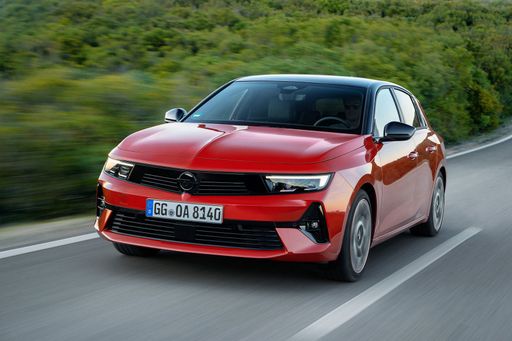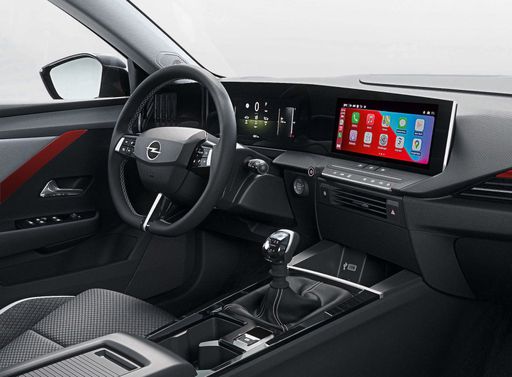Nissan Leaf vs Vauxhall Astra – Which one offers the better deal?
Both models have their strengths – but which one suits you more?
Compare performance, efficiency, price and space directly: Nissan Leaf or Vauxhall Astra?
Costs and Efficiency:
Price and efficiency are often the first things buyers look at. Here it becomes clear which model has the long-term edge – whether at the pump, the plug, or in purchase price.
Vauxhall Astra has a distinct advantage in terms of price – it starts at 25200 £, while the Nissan Leaf costs 30800 £. That’s a price difference of around 5580 £.
In terms of energy consumption, the advantage goes to the Vauxhall Astra: with 15.40 kWh per 100 km, it’s barely noticeable more efficient than the Nissan Leaf with 16.70 kWh. That’s a difference of about 1.30 kWh.
As for range, the Vauxhall Astra performs minimal better – achieving up to 419 km, about 34 km more than the Nissan Leaf.
Engine and Performance:
Under the bonnet, it becomes clear which model is tuned for sportiness and which one takes the lead when you hit the accelerator.
When it comes to engine power, the Vauxhall Astra has a hardly perceptible edge – offering 225 HP compared to 217 HP. That’s roughly 8 HP more horsepower.
In acceleration from 0 to 100 km/h, the Nissan Leaf is minimal quicker – completing the sprint in 6.90 s, while the Vauxhall Astra takes 7.50 s. That’s about 0.60 s faster.
In terms of top speed, the Vauxhall Astra performs evident better – reaching 235 km/h, while the Nissan Leaf tops out at 157 km/h. The difference is around 78 km/h.
There’s also a difference in torque: Vauxhall Astra pulls hardly perceptible stronger with 360 Nm compared to 340 Nm. That’s about 20 Nm difference.
Space and Everyday Use:
Cabin size, boot volume and payload all play a role in everyday practicality. Here, comfort and flexibility make the difference.
Both vehicles offer seating for 5 people.
In curb weight, Vauxhall Astra is slightly lighter – 1341 kg compared to 1580 kg. The difference is around 239 kg.
In terms of boot space, the Vauxhall Astra offers minimal more room – 422 L compared to 394 L. That’s a difference of about 28 L.
In maximum load capacity, the Vauxhall Astra performs convincingly better – up to 1339 L, which is about 549 L more than the Nissan Leaf.
When it comes to payload, Vauxhall Astra somewhat takes the win – 509 kg compared to 415 kg. That’s a difference of about 94 kg.
Who comes out on top?
Overall, the Vauxhall Astra shows itself to be dominates this comparison and secures the title of DriveDuel Champion.
It convinces with the more balanced overall package and proves to be the more versatile choice for everyday use.

Vauxhall Astra
Nissan Leaf
The Nissan Leaf stands out as a pioneering model in the realm of electric vehicles, known for its impressive blend of practicality and eco-friendliness. It offers a smooth and quiet driving experience, making it an ideal choice for city commuting and longer journeys alike. The interior design is both comfortable and intuitive, providing drivers with a sense of modernity and ease of use.
details @ germany.nissannews.com
@ germany.nissannews.com
 @ germany.nissannews.com
@ germany.nissannews.com
 @ germany.nissannews.com
@ germany.nissannews.com
 @ germany.nissannews.com
@ germany.nissannews.com
Vauxhall Astra
The Opel Astra exudes a sleek and modern design, making it a standout choice in the compact car segment. Its interior is thoughtfully crafted, providing both comfort and cutting-edge technology for an enhanced driving experience. The vehicle is also celebrated for its efficient performance, adeptly balancing power with fuel economy to suit urban and long-distance journeys alike.
details @ www.media.stellantis.com
@ www.media.stellantis.com
 @ www.media.stellantis.com
@ www.media.stellantis.com
 @ www.media.stellantis.com
@ www.media.stellantis.com

|

|
|
|
|
Costs and Consumption |
|
|---|---|
|
Price
30800 - 37200 £
|
Price
25200 - 40500 £
|
|
Consumption L/100km
-
|
Consumption L/100km
2.2 - 6 L
|
|
Consumption kWh/100km
16.7 - 17.8 kWh
|
Consumption kWh/100km
15.40 kWh
|
|
Electric Range
270 - 385 km
|
Electric Range
82 - 419 km
|
|
Battery Capacity
39 - 59 kWh
|
Battery Capacity
51 kWh
|
|
co2
0 g/km
|
co2
0 - 135 g/km
|
|
Fuel tank capacity
-
|
Fuel tank capacity
42 - 52 L
|
Dimensions and Body |
|
|---|---|
|
Body Type
Hatchback
|
Body Type
Hatchback
|
|
Seats
5
|
Seats
5
|
|
Doors
5
|
Doors
5
|
|
Curb weight
1580 - 1756 kg
|
Curb weight
1341 - 1736 kg
|
|
Trunk capacity
385 - 394 L
|
Trunk capacity
352 - 422 L
|
|
Length
4490 mm
|
Length
4374 mm
|
|
Width
1788 mm
|
Width
1860 mm
|
|
Height
1540 - 1545 mm
|
Height
1432 - 1488 mm
|
|
Max trunk capacity
790 L
|
Max trunk capacity
1268 - 1339 L
|
|
Payload
384 - 415 kg
|
Payload
414 - 509 kg
|
Engine and Performance |
|
|---|---|
|
Engine Type
Electric
|
Engine Type
Petrol, Diesel, Electric, Petrol MHEV, Plugin Hybrid
|
|
Transmission
Automatic
|
Transmission
Manuel, Automatic
|
|
Transmission Detail
Reduction Gearbox
|
Transmission Detail
Manual Gearbox, Automatic Gearbox, Reduction Gearbox, Dual-Clutch Automatic
|
|
Drive Type
Front-Wheel Drive
|
Drive Type
Front-Wheel Drive
|
|
Power HP
150 - 217 HP
|
Power HP
130 - 225 HP
|
|
Acceleration 0-100km/h
6.9 - 7.9 s
|
Acceleration 0-100km/h
7.5 - 10.6 s
|
|
Max Speed
144 - 157 km/h
|
Max Speed
170 - 235 km/h
|
|
Torque
320 - 340 Nm
|
Torque
230 - 360 Nm
|
|
Number of Cylinders
-
|
Number of Cylinders
3 - 4
|
|
Power kW
110 - 160 kW
|
Power kW
96 - 165 kW
|
|
Engine capacity
-
|
Engine capacity
1199 - 1598 cm3
|
General |
|
|---|---|
|
Model Year
2019
|
Model Year
2023 - 2025
|
|
CO2 Efficiency Class
A
|
CO2 Efficiency Class
D, A, C, B
|
|
Brand
Nissan
|
Brand
Vauxhall
|
What drivetrain options does the Nissan Leaf have?
Available configurations include Front-Wheel Drive.
The prices and data displayed are estimates based on German list prices and may vary by country. This information is not legally binding.
